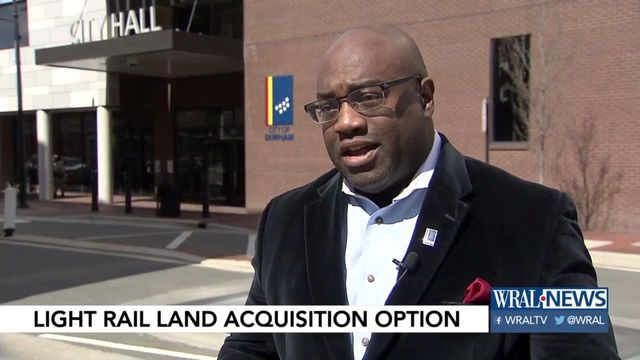Duke rejects GoTriangle bid for more talks, says light-rail route is 'simply not workable'
Duke University has rejected GoTriangle's request to enter mediation on the Durham-Orange Light-Rail project. The proposed route is "simply not workable," the school says.
Posted — UpdatedDuke University has rejected GoTriangle's offer of an extended deadline to reach a light-rail agreement, saying the current route is "simply not workable" and declining to enter into any negotiations.
In a letter signed by Duke President Vincent E. Price, Chancellor for Health Affairs A. Eugene Washington and Executive Vice President Tallman Trask III, the school on Thursday refuted GoTriangle's claims that Duke had not mentioned its concerns about electromagnetic waves, vibrations and utilities earlier in the process.
"Unfortunately, Duke's concerns and requests for consideration of alternate routes -- which have been stated in almost identical form since 1999 -- were ignored, minimized or redirected ..." the letter reads.
The letter says the school agreed "in good faith" in November to 2018 to continue discussions with GoTriangle.
"However," it says, "the results of additional analysis and information that we have now received confirms that the DOLRT route along Erwin Road poses significant and unacceptable risks to the safety of the nearly 1.5 million patients who receive care at Duke Hospital and Clinics each year, and the future viability of health care and research at Duke."
GoTriangle spokesman Michael Charbonneau said, “GoTriangle has received a response letter from Duke University this evening and our staff will carefully review it. The GoTriangle Board of Trustees will consider and discuss this new information as part of its work session Tuesday March 12.”
Duke's concerns are that electromagnetic waves generated by light-rail trains could affect sensitive research and treatment equipment in the hospital buildings; that vibrations both from construction and from the operation of light rail could pose a hazard to extremely delicate surgery; and that construction of the project could sever the hospital's power supply.
"We have been working on this issue for two years and have been unable to reach any kind of reasonable solution," the letter says of the utility risk. "Duke has spent hundreds of millions of dollars producing a strong, resilient and redundant underground utility network that our patient care and research operations rely upon for continuous service ... Your recommendation to use a vulnerable aerial wire to be the sole source of electricity indicates how far apart we are on this important matter."
Duke announced on Feb. 27 that it would not be able to meet a Feb. 28 deadline for committing to the project because of those concerns.
Earlier this week, GoTriangle President and CEO Jeff Mann and Ellen Reckhow, chairwoman of the GoTriangle Board of Trustees, had sent a letter to Price, offering to extend the deadline by four to six weeks and pledging to address Duke's concerns. The letter called for "mediated negotiations."
But also this week, a Durham City councilman suggested using eminent domain to take the necessary land from the university. Eminent domain allows governments to take land that is needed for a public use, but requires the government to pay for the land. The amount would likely be determined by a jury. GoTriangle had wanted Duke to donate its land to the project.
"I don’t know if it’s a good idea, but I think it’s an inevitable idea. It’s a discussion that we have to have as a government," said Durham City Councilman Mark-Anthony Middleton.
"It’s not that we want to use eminent domain and we’re not looking to be at war or pick a fight with Duke. But there’s a government integrity issue at stake."
Michael J. Schoenfeld, Duke's vice president for public affairs and media relations, said using eminent domain is "a decision that the city and county officials will have to make, and we assume that they will carefully consider the legal and political costs of making such a move."
Related Topics
• Credits
Copyright 2024 by Capitol Broadcasting Company. All rights reserved. This material may not be published, broadcast, rewritten or redistributed.






